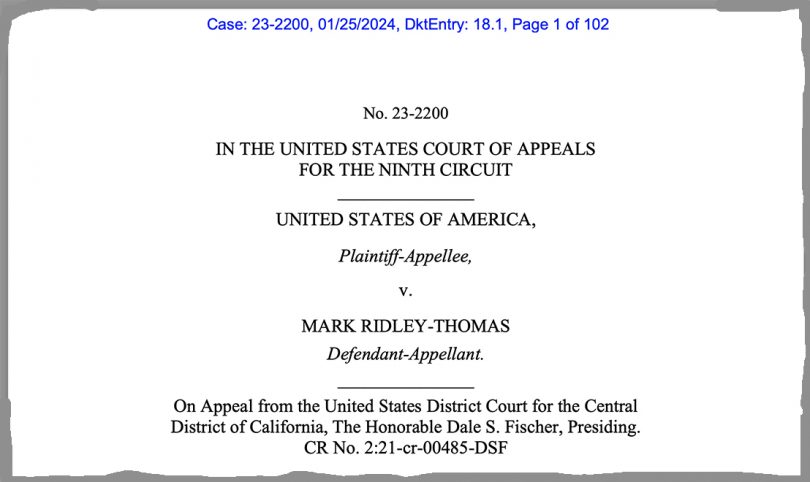by Rick Tuttle
Editor’s note:
On Thursday, January 25, the team of five appellate attorneys representing Mark Ridley-Thomas filed their 102-page brief in order to appeal their client’s conviction with the United States Court of Appeals for the Ninth Circuit.
Now, on Monday, April 8, federal prosecutors are expected to file their response to the defense filing.
While we wait for the government’s filing, we thought you’d be interested in this Op-Ed by former city controller, Rick Tuttle, whose opinion regarding the federal case brought against Ridley-Thomas is informed by Tuttle’s own experience as a four-term public official.
So read on.
****
Why this conviction will hurt the constituents public officials are elected to serve
A functioning democracy demands that public officials are accessible and responsive to our constituents. For us to effectively perform our duties, we need the ability to interact with the people we represent, which includes constituents who have supported us in the past and engage with us while we hold public office.
As a former L.A. City Controller, constituent services were at the forefront of the service I performed as an elected official. Indeed, most elected officials, current and former, share a deep appreciation of our constituent relationships. We have seen first-hand how this engagement makes a positive difference in voters’ lives.
Shiela Kuehl, who served on the LA County Board of Supervisors, and in the state legislature, and Jim Brulte, a former member of the California State Senate, recently co-authored a “friend of the court” brief in response to the March 23, 2023, jury verdict in the harmful case brought by government prosecutors against Mark Ridley-Thomas.
MRT, as he is known, is appealing his recent conviction for bribery and honest services fraud. Unless overturned, the federal government’s overreach in this case will have a chilling effect on good government and policymaking and will unacceptably blur the lines between appropriate political interactions with constituents and public corruption.
Mark Ridley-Thomas was convicted for bribery and honest services fraud for making a $100,000 donation from his ballot committee to the University of Southern California for use by a nonprofit organization, PRPI, run by his son to hire a staffer to conduct polling.
The U.S. Attorney’s office never disputed that MRT’s donation was legal and properly disclosed under California’s campaign finance laws. Equally important, this legal contribution did not put a single dollar in MRT’s wallet, the pocket of an immediate family member, or otherwise favorably impact his expenses or liabilities.
The government’s theory is that MRT made an indirect donation to PRPI, rather than a direct one, because he thought it would be beneficial to his reputation and/or political brand not to be associated with it. What MRT (allegedly) perceived as a reputational perk became the bribe in a quid pro quo scheme. But if politicians aren’t free to solicit or accept what they perceive to be reputational benefits, then few constituent interactions are safe.
California has a comprehensive framework governing elected officials’ use of campaignand ballot measure committee funds. Ridley-Thomas was on the right side of these laws in his dealings with USC.
The impact of his conviction dramatically expands the federal government’s intrusion into state public corruption laws. Brulte’s and Kuehl’s concern is that because of this enhanced involvement, “normal” engagements between elected officials and constituents will be obstructed and, in doing so, will dissuade other elected officials from making charitable donations to groups for fear of running afoul of overzealous prosecutors who may characterize any resulting benefit as an abuse of power.
Real harm will flow from deterring such donations—damage that will be felt by the type of underserved communities that politicians effectively represent throughout the state.
A synergetic relationship is a critical feature of democracy. Constituents support candidates who hold shared beliefs, values and interests. Candidates who are elected are expected to be responsive to constituent concerns.
Mark Ridley-Thomas’ conviction creates unacceptable risk for future elected officials on any commonplace exchange with voters. It will hurt the constituents we are elected to serve. Officials will be more likely to keep constituents at arm’s length and we will be less inclined to donate to educational, civic, and other nonprofit organizations, especially if those organizations engage with local government.
Even if these donations are allowed under state law – as MRT’s was—the risk of potential federal scrutiny and/or criminal prosecution would be too great.
For elected officials to effectively perform our duties, we must have the ability to interact with the people we represent-—this includes constituents who have supported us and those entities who do business with local governments. The federal government’s overreach in U.S. vs Mark Ridley-Thomas will have a negative effect on democracy and constituent service.
It must be overturned on appeal.
****
Rick Tuttle is the former Controller for the City of Los Angeles, where he served four four-year terms.


Thank You Rick for standing up and being courageous not only for MRT but for all who are elected .
More voices like yours are needed, especially in these tumultuous times .
The Blame game is no game when peoples lives can be ruined.